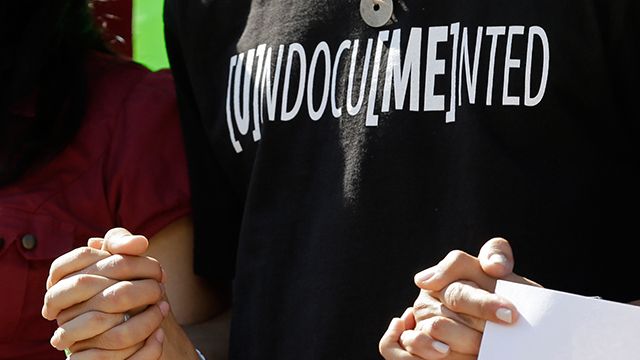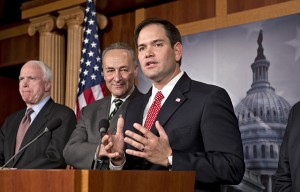
President Obama’s outline for immigration reform, released yesterday during his Las Vegas speech, has much in common with the plan put forth by a bipartisan group of eight senators on Monday. But there’s one important way Obama’s plan differs from the proposals of the “gang of eight.”
Under the senators’ plan — and Obama’s — the majority of undocumented immigrants will have to “go to the back of the line” — wait until every authorized immigrant applying for a green card has received one, and until the new enforcement measures — including a “secured,” drone-patrolled border — are in place. The New York Times editorial board writes that this hold on the path to citizenship, as currently formulated, could be indefinite:
…demanding an airtight 2,000-mile border before making citizenship possible for the undocumented basically means the path will never be open. The immigration system needs sensible, solid layers of enforcement to end the illegal border flow and illegal hiring. But the other part of reform — moving to make citizens of the shadow population — cannot be held hostage to an impossible standard.

Sen. Marco Rubio takes a reporter's question during the "gang of eight's" news conference at the Capitol on Monday. From left are Sen. John McCain (R-AZ), Sen. Charles Schumer (D-NY), and Marco Rubio. (AP Photo/J. Scott Applewhite)
But under the senators’ plan, the task of declaring the border secure would fall to what’s being called the “Southwest Commission” — a group of governors, attorneys general and community leaders from the Southwestern border states. As proposed, the commission will almost certainly include individuals unlikely to support any kind of path to citizenship — Arizona Governor Jan Brewer, for example. If the Southwest Commission is required to declare the border secure before undocumented immigrants can start down the path to citizenship, Brewer and like-minded commission members will have the power to hold up the works indefinitely.
This point is not only a source of disagreement between the president and the “gang of eight” — even the gang isn’t sure exactly how much power the commission would have. The Washington Post‘s Greg Sargent reports that while Democrats see the commission’s role as purely advisory — it does not have absolute veto power — one gang member, Marco Rubio (R-FL), and perhaps other Republicans, aren’t so sure. A source close to Rubio told Sargent:
Senator Rubio has made clear that all of the enforcement mechanisms must be in place and operational before a pathway to citizenship is made accessible to undocumented immigrants. The details of the metrics that will be used to determine that still need to be worked out by the bipartisan group, but clearly the commission’s recommendation will be a central component to that.
In an interview with Rush Limbaugh yesterday, Rubio clarified his position further, indicating that he would walk away from any bill that does not require the border to first be secured before undocumented immigrants can seek green cards.
“Unless there’s real enforcement triggers we are not going to have a bill that moves on the opportunity to apply for a green card,” Rubio said. He added: “I’m not going to be part of a bidding war to see who can put the most lenient path forward” if Obama demands a smoother path to citizenship.
President Obama said yesterday that Americans are reaching a consensus that “now is the time” for reform, and with Republicans rethinking their position on immigration after the 2012 elections, he may be right. At the moment, the path forward is there. But one sticking point — the Southwest Commission’s veto power — could become the contentious issue that causes immigration reform to lose Republican support and fall apart — as it did five years ago.

